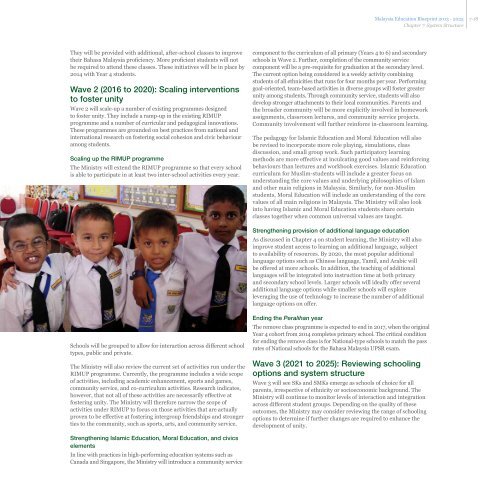Preliminary-Blueprint-Eng
Preliminary-Blueprint-Eng
Preliminary-Blueprint-Eng
Create successful ePaper yourself
Turn your PDF publications into a flip-book with our unique Google optimized e-Paper software.
They will be provided with additional, after-school classes to improve<br />
their Bahasa Malaysia proficiency. More proficient students will not<br />
be required to attend these classes. These initiatives will be in place by<br />
2014 with Year 4 students.<br />
Wave 2 (2016 to 2020): scaling interventions<br />
to foster unity<br />
Wave 2 will scale-up a number of existing programmes designed<br />
to foster unity. They include a ramp-up in the existing RIMUP<br />
programme and a number of curricular and pedagogical innovations.<br />
These programmes are grounded on best practices from national and<br />
international research on fostering social cohesion and civic behaviour<br />
among students.<br />
scaling up the riMuP programme<br />
The Ministry will extend the RIMUP programme so that every school<br />
is able to participate in at least two inter-school activities every year.<br />
Schools will be grouped to allow for interaction across different school<br />
types, public and private.<br />
The Ministry will also review the current set of activities run under the<br />
RIMUP programme. Currently, the programme includes a wide scope<br />
of activities, including academic enhancement, sports and games,<br />
community service, and co-curriculum activities. Research indicates,<br />
however, that not all of these activities are necessarily effective at<br />
fostering unity. The Ministry will therefore narrow the scope of<br />
activities under RIMUP to focus on those activities that are actually<br />
proven to be effective at fostering intergroup friendships and stronger<br />
ties to the community, such as sports, arts, and community service.<br />
strengthening islamic education, Moral education, and civics<br />
elements<br />
In line with practices in high-performing education systems such as<br />
Canada and Singapore, the Ministry will introduce a community service<br />
Malaysia Education <strong>Blueprint</strong> 2013 - 2025<br />
Chapter 7 System Structure<br />
component to the curriculum of all primary (Years 4 to 6) and secondary<br />
schools in Wave 2. Further, completion of the community service<br />
component will be a pre-requisite for graduation at the secondary level.<br />
The current option being considered is a weekly activity combining<br />
students of all ethnicities that runs for four months per year. Performing<br />
goal-oriented, team-based activities in diverse groups will foster greater<br />
unity among students. Through community service, students will also<br />
develop stronger attachments to their local communities. Parents and<br />
the broader community will be more explicitly involved in homework<br />
assignments, classroom lectures, and community service projects.<br />
Community involvement will further reinforce in-classroom learning.<br />
The pedagogy for Islamic Education and Moral Education will also<br />
be revised to incorporate more role playing, simulations, class<br />
discussion, and small group work. Such participatory learning<br />
methods are more effective at inculcating good values and reinforcing<br />
behaviours than lectures and workbook exercises. Islamic Education<br />
curriculum for Muslim-students will include a greater focus on<br />
understanding the core values and underlying philosophies of Islam<br />
and other main religions in Malaysia. Similarly, for non-Muslim<br />
students, Moral Education will include an understanding of the core<br />
values of all main religions in Malaysia. The Ministry will also look<br />
into having Islamic and Moral Education students share certain<br />
classes together when common universal values are taught.<br />
strengthening provision of additional language education<br />
As discussed in Chapter 4 on student learning, the Ministry will also<br />
improve student access to learning an additional language, subject<br />
to availability of resources. By 2020, the most popular additional<br />
language options such as Chinese language, Tamil, and Arabic will<br />
be offered at more schools. In addition, the teaching of additional<br />
languages will be integrated into instruction time at both primary<br />
and secondary school levels. Larger schools will ideally offer several<br />
additional language options while smaller schools will explore<br />
leveraging the use of technology to increase the number of additional<br />
language options on offer.<br />
ending the Peralihan year<br />
The remove class programme is expected to end in 2017, when the original<br />
Year 4 cohort from 2014 completes primary school. The critical condition<br />
for ending the remove class is for National-type schools to match the pass<br />
rates of National schools for the Bahasa Malaysia UPSR exam.<br />
Wave 3 (2021 to 2025): reviewing schooling<br />
options and system structure<br />
Wave 3 will see SKs and SMKs emerge as schools of choice for all<br />
parents, irrespective of ethnicity or socioeconomic background. The<br />
Ministry will continue to monitor levels of interaction and integration<br />
across different student groups. Depending on the quality of these<br />
outcomes, the Ministry may consider reviewing the range of schooling<br />
options to determine if further changes are required to enhance the<br />
development of unity.<br />
7-18


